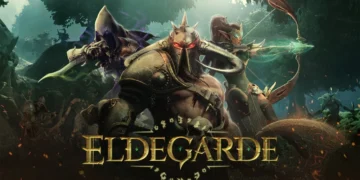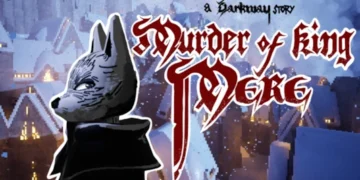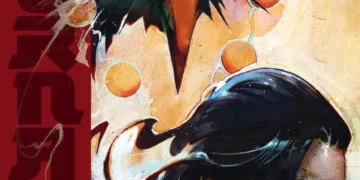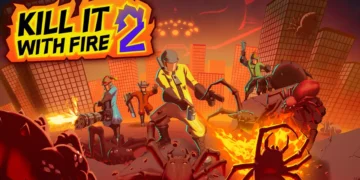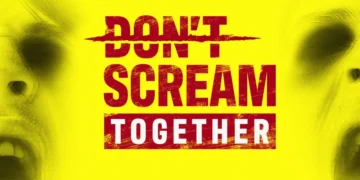With the Witchfinder: The Gates of Heaven out tomorrow we got a chance to sit down with Chris Roberson and find out all about the new series. Chris is co-writing the series with Mike Mignola and also working with the artist D’Israeli on the series. As well as working in the Mignolaverse with Mike Mignola over the past few years, Chris had written numerous comics including The Shadow, izombie and Edison Rex.
When did you first come across the character of Sir Edward Grey and what did you think about him?
I was intrigued from the very beginning when the character was mentioned briefly in the first issue of Hellboy: Wake the Devil, but when we got a fuller introduction to him in Witchfinder: In The Service of Angels, I was hooked. I’ve always been a fan of the Victorian era, and Victorian-era detective stories, and especially Victorian-era occult detectives, and so in many ways it felt like the Witchfinder stories were being made specifically for me to enjoy. Fortunately, I wasn’t the only one to respond positively, and now some years later I’m in the enviable position of getting to help tell new Witchfinder stories.
What is it like working with Mike Mignola?
Absolutely fantastic. In addition to being one of my all-time favorite writers and artists, Mike is also a great guy and a lot of fun to talk to. And considering that my job involves talking with him about monsters and mythology and weird history and old movies that we like, I can’t complain!
Has the process of working with Mike changed since you worked on Witchfinder: City of the Dead with him?
It’s always evolving, and changes from project to project, but at the heart of it each of those projects has begun as a conversation between me and Mike, often including our editors (formerly Scott Allie and now Katii O’Brien) about what would be an interesting story to tell. Mike is incredibly generous with his collaborators, and always encourages us to including the kinds of things that we’re most interested in and passionate about.
What made D’Israeli the perfect artist for Witchfinder: The Gates of Heaven?
From the earliest discussions about the ideas that eventually developed into The Gates of Heaven, we knew that (a) the story would be set in Victorian London and (b) that there would be a steampunk-tech aspect to it. And D’Israeli was the first name I suggested to Mike when we started talking about who might handle the art duties, as I knew that there was no one better equipped to handle that setting and era while also suited to tackle the steampunk vibe we were going for. And thankfully I was right, as the pages have turned out looking amazing!

Could you tell us a bit about the origin of The Gates of Heavens story?
Both The Gates of Heaven and the recent Rasputin: Voice of the Dragon miniseries grew out of a series of conversations that I had with Mike at C2E2 a couple of years ago. The genesis of The Gates of Heaven in particular was a suggestion that Mike had about a new group of characters that we could introduce into Sir Edward Grey’s world, which slotted in perfectly with some ideas that I had about expanding the cast of characters, and from there it was just a question of figuring out the most interesting story that we could tell that would make the best use of that cast.
What can you tell us about The Gates of Heavens story?
Sir Edward Grey, occult investigator in the service of Queen Victoria, becomes aware that a series of arcane artifacts have gone missing, often in connection with strange deaths and disappearances. As he continues his investigations, he discovers that he is not the only one working in the shadows of Victoria’s England, and there are far larger issues at stake than he realized.
How will The Gates of Heavens story effect Sir Edward Grey?
Sir Edward has often been a loner in past Witchfinder stories, though he has sought out the assistance of others when the circumstances demanded it. But in The Gates of Heaven he will find that he’s facing a threat that is too large for him to tackle on his own, and will learn that he need not always go it alone.

Do you have a favourite scene from The Gates of Heavens story and if so can you tell us about it?
I do, yes, but I’m afraid that I can’t say too much about it without running the risk of spoiling things! Suffice it to say that there is a special kind of magic that happens when a few sentences worth of description on the script page is brought to glorious life by the artist’s hand.
Is there anything you tell us about the villain for The Gates of Heavens story?
Only that no one considers themselves to be a villain, but sometimes things get out of hand.
What’s your day to day process for working on the book?
This project had a LONG gestation period. More than a year passed between the initial conversations that we had and the time when we actually started to nail down the outline, and then the outline went through many, many revisions over the course of months before everyone was happy with the shape of it and we could move on to the scripts. And then the first drafts of all five issues’ scripts were written before D’Israeli started working on the art for the first issue, so thankfully we had time to go back and tweak and revise things in the earlier issues as needed once we got to the later issues and realized that it would be useful to have set some things up earlier on.

What has it been like working with D’Israeli?
An absolute joy. I’ve been a fan of his work for nearly thirty years, ever since I first saw his work in the pages of Deadline, and have read everything he’s worked on that I could get my hands on ever since. I knew that he would do a fantastic job with the material, but he’s far exceeded even my high expectations.
Can you give us a hint about how the Mignolaverse will look like after The Gates of Heavens story concludes?
Well, this is a period piece that takes place entirely in 19th century London, so the larger Mignolaverse will not be significantly changed by what takes place in this story. That said, we will be exploring the connections between Sir Edward’s corner of the world and that larger universe in the course of The Gates of Heaven, and so the canvas is going to be a little broader and richer by the time we’re through.
What can readers of Hellboy and B.P.R.D. look forward to?
We structure these stories so that anyone can pick them up and enjoy them even if they’re not familiar with any of the other series, but longtime readers of the Hellboy and B.P.R.D. books will find a number of unexpected surprises along the way.
What comics are you reading right now?
These days I’m reading a lot of All Ages and YA original graphic novels (I’m halfway through Vera Brosgol’s Be Pepared at the moment, and have recently enjoyed Molly Ostertag’s The Witch Boy and Jen Wang’s The Prince and the Dressmaker). I recently finished rereading all of Cullen Bunn and Brian Hurtt’s The Sixth Gun, and I eagerly await each new issue of Kieron Gillen and Jamie McKelvie’s The Wicked + The Divine, Kurt Busiek and Brent Anderson’s Astro City, and Brian K. Vaughan and Cliff Chiang’s Paper Girls.

What projects are you currently working on?
In addition to various miniseries set in the world of Hellboy, I’m doing another work-for-hire comic gig that hasn’t been announced yet but which is really cool, and in my free time I’m working on a YA prose novel.
Any message for the ComicBuzz readers?
If you enjoy Witchfinder: The Gates of Heaven, please let your friends know! Maybe they’ll enjoy it, too!
Witchfinder: The Gates of Heaven is out in stores and available digitally tomorrow.
We would like to thank Chris for taking the time to talk to us.


